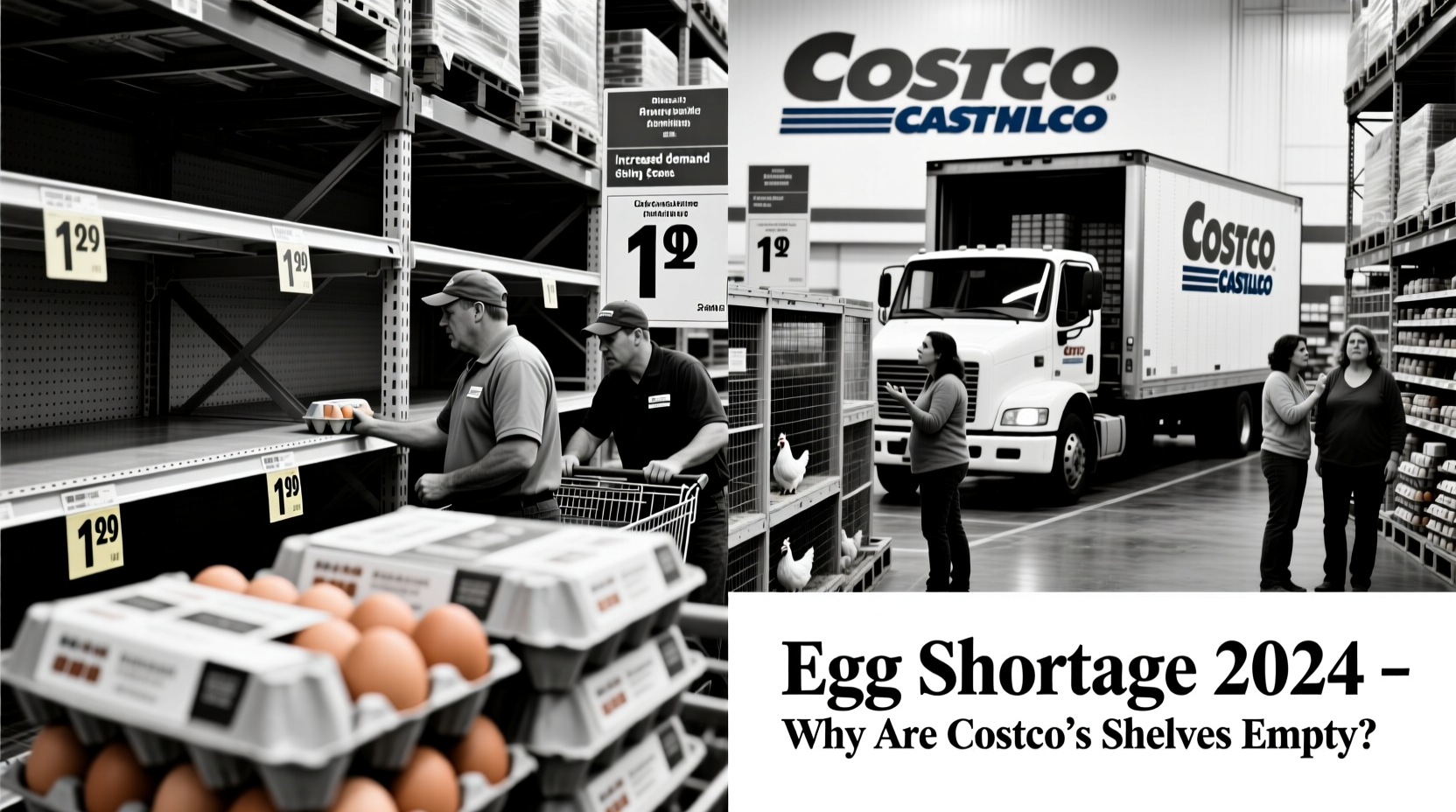If you’ve recently walked into your local Costco expecting to stock up on a giant 30-egg carton—only to find empty shelves—you’re not alone. Across the U.S. and parts of Canada, Costco members have reported sporadic or complete shortages of eggs. This isn’t a one-off issue; it’s part of a broader disruption in the poultry supply chain that has affected retailers from Walmart to Kroger. But why exactly is this happening, and more importantly, when will Costco restock?
The absence of eggs at Costco isn’t due to a single cause but rather a combination of biological, economic, logistical, and consumer-driven factors. Understanding these elements helps clarify why your favorite bulk eggs might be missing—and whether they’ll return soon.
Avian Influenza: The Primary Disruptor

The most significant factor behind the current egg shortage is avian influenza, commonly known as bird flu. Since early 2022, the U.S. has faced one of the worst outbreaks in decades. According to the U.S. Department of Agriculture (USDA), over 58 million birds have been affected by highly pathogenic avian influenza (HPAI) across commercial and backyard flocks.
When an outbreak occurs, entire flocks are culled to prevent further spread. This means millions of laying hens are lost in a short period. Even after containment, rebuilding flocks takes months—chicks must mature for about 18–20 weeks before they start laying eggs. This lag creates a prolonged supply gap.
Supply Chain Challenges Beyond Bird Flu
While avian flu is the main culprit, other systemic issues compound the problem:
- Poultry Feed Costs: Corn and soy prices have risen sharply due to climate volatility and global trade disruptions, increasing production costs for egg farmers.
- Labor Shortages: Poultry farms and processing plants continue to face staffing challenges, slowing down operations and distribution.
- Transportation Delays: Fuel prices and trucking availability impact how quickly eggs move from farms to warehouses and stores.
- Seasonal Demand Spikes: Events like Easter, Mother’s Day, and holiday baking seasons increase demand, straining already-tight supplies.
Costco, which relies on consistent volume from large-scale suppliers, cannot always fill its massive egg orders under these conditions. When a regional supplier loses even one major farm to disease, it ripples through the network.
How Costco Manages Egg Inventory
Costco operates on a just-in-time inventory model for perishables. Unlike dry goods, eggs have a limited shelf life, so stores don’t overstock. Instead, they rely on frequent deliveries—sometimes daily—for fresh items.
However, during shortages, this system becomes a vulnerability. If a distribution center receives fewer eggs than expected, nearby stores may go days without restocking. Costco also prioritizes fairness, rotating shipments between locations to avoid hoarding in one area.
Additionally, Costco sells eggs in large quantities (often 30–36 per pack), which increases turnover speed. A single family buying one case removes far more units than a standard grocery shopper, accelerating depletion.
“Large-format retailers like Costco are disproportionately impacted during egg shortages because their business model depends on high-volume, low-frequency deliveries.” — Dr. Rebecca Jenkins, Agricultural Economist at Iowa State University
Regional Variability in Egg Availability
One reason some Costco locations have eggs while others don’t is geographic disparity. Outbreaks tend to cluster in specific regions—such as the Midwest “egg belt” states (Iowa, Minnesota, Nebraska)—where the majority of U.S. eggs are produced.
When farms in these areas are hit, the effect is national but uneven. Stores farther from outbreak zones may receive stable supply longer, while those dependent on affected distributors see gaps sooner.
For example, a Costco in California might get eggs from Pacific Northwest farms unaffected by recent outbreaks, while a store in Ohio could rely on Midwestern suppliers currently recovering from flock losses.
Step-by-Step: What Happens From Farm to Costco Shelf
To understand the fragility of the egg supply, here’s the typical journey—and where breakdowns occur:
- Egg Laying: Hens lay eggs collected daily on commercial farms.
- Packing: Eggs are cleaned, graded, and packed at centralized facilities.
- Distribution: Loaded onto refrigerated trucks bound for regional warehouses.
- Store Delivery: Warehouses dispatch to individual Costco locations.
- Shelf Stocking: Store staff place eggs on shelves, typically multiple times per week.
A failure at any stage—especially stages 1 or 2 due to bird flu—halts the entire chain. Even if transportation and retail are ready, no eggs means no delivery.
Tips for Costco Shoppers During Egg Shortages
- Visit early in the morning when restocking is most likely.
- Ask warehouse staff when the next egg shipment is expected.
- Consider purchasing smaller packs at regular grocery stores if available.
- Freeze whisked eggs in ice cube trays for later use in cooking and baking.
- Explore plant-based egg alternatives like Just Egg or Bob’s Red Mill Egg Replacer.
Checklist: How to Navigate the Costco Egg Shortage
- ✅ Check Costco’s website or app for real-time egg availability
- ✅ Call your local warehouse to confirm stock status
- ✅ Sign up for email alerts or follow local Costco social media pages
- ✅ Buy eggs early in the week—Friday and Saturday see highest demand
- ✅ Consider switching to organic or cage-free brands if conventional are out
- ✅ Keep backup breakfast options at home (oatmeal, yogurt, frozen waffles)
Mini Case Study: The Portland Warehouse Experience
In March 2023, the Costco in Beaverton, Oregon, went nearly three weeks without large egg packs. Local news covered frustrated shoppers posting videos of bare shelves. The root cause? A major supplier in Idaho lost two laying facilities to avian flu in February.
Despite Costco’s efforts to source from alternate West Coast producers, volume couldn’t meet demand. Store managers began limiting purchases to one pack per member and increased communication via in-store signage and Facebook updates.
By late April, eggs returned—but only after the supplier reintroduced new pullets (young hens) and achieved partial production recovery. This case highlights how localized disruptions can create ripple effects across chains.
Do’s and Don’ts During an Egg Shortage
| Do | Don’t |
|---|---|
| Buy eggs when you see them—don’t assume they’ll be back tomorrow | Panic-buy dozens of eggs if you don’t need them immediately |
| Use the Costco app to check inventory remotely | Expect unlimited stock during peak seasons or outbreaks |
| Store extra eggs in the freezer (whisked or cracked) | Leave eggs unrefrigerated for more than 2 hours |
| Support local farms with direct egg sales | Blame store staff—they don’t control shipments |
Frequently Asked Questions
Is Costco still selling eggs anywhere?
Yes, but availability varies widely by location. Some warehouses have consistent supply, especially in regions less affected by bird flu. Use the Costco website to search for “eggs” and filter by your nearest store to check real-time stock.
Why does Costco run out of eggs faster than other stores?
Costco sells eggs in bulk—typically 30 or 36 per pack—which means each transaction removes many more units than a standard grocery purchase. Combined with high customer traffic, this leads to rapid shelf turnover. When supply is limited, bulk format accelerates depletion.
Will egg prices go down soon?
Not immediately. Prices remain elevated due to reduced supply and higher production costs. The USDA projects gradual price declines as flocks recover, but full normalization could take until late 2024 or early 2025, depending on future bird flu activity.
Conclusion: Staying Ahead of the Shortage
The Costco egg shortage isn’t a glitch—it’s a symptom of deeper vulnerabilities in the food supply chain. While avian flu remains the primary driver, rising costs, labor issues, and consumer demand patterns all play a role. There’s no guaranteed fix overnight, but awareness and adaptability can help you stay stocked.
By monitoring inventory, adjusting shopping habits, and exploring alternatives, you can navigate this shortage without sacrificing meal plans or nutrition. The key is flexibility and timely action.









 浙公网安备
33010002000092号
浙公网安备
33010002000092号 浙B2-20120091-4
浙B2-20120091-4
Comments
No comments yet. Why don't you start the discussion?